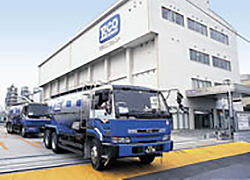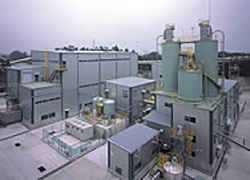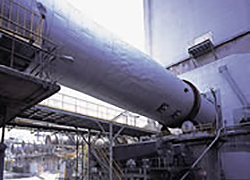Environmental Business
We must hasten the transition from the conventional method of disposing of unwanted material as waste to reusing and recycling this into valuable resources. Taiheiyo Cement Group uses a variety of municipal and industrial waste as raw material for cement as well as fuel. We are making efforts to develop an efficient waste recycling system to help create a "zero waste" society. Modern lifestyles and industrial activity generate an enormous amount of waste. We are refining the technologies needed to reuse this waste, and are using our facilities to pursue research and develop the ability to accept more waste. We are stepping up our activities in this area with a focus on global themes.

▲Ichihara Ecocement Corporation
(Chiba)
(Chiba)

▲Ash Washing System of Kumagaya Plant (Saitama)

▲Applied Kiln (AK) System of Saitama Plant
Using municipal waste as a fuel and raw material for cement |
|---|
| Cement is made through calcination (burning) at a high temperature of 1,450 °C. This process can be used to detoxify and recycle nearly all waste. Ecocement is made primarily from municipal waste incineration ash and sewage sludge and is a symbolic of our "zero-waste" initiatives. This product helps reduce the significant amount of incineration ash transported to landfills. We are also working to develop and commercialize environmental recycling technologies, including our Ash Washing System for desalinating municipal waste incineration ash and transforming it into a raw material for cement, and our AK System for recycling raw garbage using rotary kilns and fermentation technology. |
Recycling in partnership with the electric power and steel industries |
|---|
| We supply coal-fired power plants with flue gas desulfurization materials such as calcium carbonate made from limestone. These materials help prevent air pollution and acid rain. At the same time, we recycle coal ash produced at power plants as a raw material for cement and use it to manufacture a variety of civil engineering materials. We reuse flue gas gypsum and effectively use slag and iron oxide, which are discarded in large quantities from iron mills, as raw materials for cement. We also sell slag powder and other inorganic materials, coal, heavy oil, and other fuels, as well as chemicals and gypsum in an effort to enhance recycling between industries. |
Recycling all kinds of waste |
|---|
| To build recycling-based societies, systems that can handle a wide range of materials are needed. We recycle materials as diverse as used tires, waste plastics, paper sludge, waste casting sand, and other industrial waste as well as surplus soil from water purification, sewage sludge, dredging sludge, and other wastes discarded from municipalities. We are also involved in CFC treatment and the building of waste treatment plants. We are actively pursuing a wide range of recycling businesses. |

We effectively use a variety of waste and byproducts as fuel and raw materials to make cement, and we make every effort through process management and quality control to ensure that all products we create conform to Japan Industrial Standards (JIS).
Note: "minimum emissions" is a concept based on natural circulation systems in which the amount of waste is reduced to as close to zero as possible by creating a complete recycling-based manufacturing system where waste discarded during manufacturing in one industry is recycled and used as a raw material in another industry.
